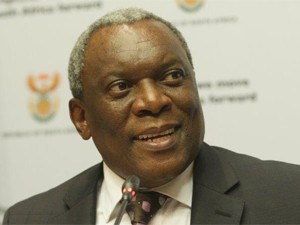
The Independent Communications Authority of South Africa (ICASA) believes it "followed the law" when it issued an invitation for telecoms operators to take part in an auction for in-demand radio frequency spectrum.
This as the regulator defended itself after the Department of Telecommunications and Postal Services (DTPS) announced minister Siyabonga Cwele planned to take legal action to review ICASA's issue of an invitation to apply (ITA) earlier this month.
"ICASA has noted the contents of the minister's statement and believe we have followed the law as it currently applies in publishing the ITA," ICASA spokesperson Paseka Maleka told ITWeb.
He says ICASA will "decide on a course of action" once papers are filed with the courts.
Cwele is concerned ICASA's ITA for the auctioning of the spectrum was issued "without consultation and prior notification to government as the policy-maker" and says ICASA is "not prepared to subject itself to the intergovernmental cooperation governance procedures".
On 15 July, ICASA issued an invitation to operators to apply for licences for spectrum in the 700MHz, 800MHz and 2.6GHz bands, to be used for next-generation mobile service in SA.
However, the DTPS says the regulator defied the department in issuing the invitation. ICASA apparently "ignored" a request from government to halt the auction process in September 2015. The regulator and department also held two meetings this month to discuss a way forward but "failed to resolve the matter amicably".
The department also voiced its concern over the "haste with which ICASA is proceeding to dispose of the spectrum given that this spectrum will not be immediately available". According to ICASA's timeline, interested parties have until 3 October to apply for the spectrum and the auction process will take place in mid-January 2017, with licences issued by the end of March.
"The position of government is that it is the custodian of spectrum which is a national and public resource and whose utilisation must benefit all the people of South Africa," the DTPS said.
Bogged down
Meanwhile, the Democratic Alliance (DA) has appealed to the minister to abandon his legal action to stop the spectrum auction. DA shadow minister of telecommunications and postal services, Marian Shinn, says it is time to let ICASA exercise its authority as a chapter nine institution to act impartially in the best interest of SA.

"ICASA's bold step to issue the invitation to prospective bidders came after 10 years of dithering on the spectrum policy by successive ANC communications ministers over how it was best to allocate the high-demand spectrum to 'new' entrants to the telecommunications sector."
Shinn says that in February, Cwele made it clear to the parliamentary portfolio committee on telecommunications and postal services that he preferred a closed-bid process, rather than an auction of spectrum.
"This revealed his conflict with ICASA which told us that an auction was the most efficient and transparent method to assign spectrum."
Cwele maintains that a key objection to the ITA's release is that there is still no clear policy direction on spectrum because "the policy process is ongoing but as yet still incomplete". Shinn, however, believes spectrum policy is "unnecessarily bogged down in the ICT Policy White Paper review process that was started in 2012, and that is now entangled in a tug-of-war of competing factions in the ANC's communications sub-committee after it was submitted to Cabinet in March".
"The reasons why successive communications ministers have delayed the issue of policy and the assignment of spectrum have never been clear. But what is certain is that repeated delays by politicians are negatively impacting the empowerment, through ICTs, of all South Africans - particularly the marginalised communities - and is a major hindrance to the economic growth and job creation potential of South Africa," adds Shinn.
Spectrum starvation
In a new report, global mobile operators association, GSMA, urged policy-makers across the African region to step up efforts to allow mobile operators to have access to the spectrum they need, so that Africans can enjoy the "major social and economic benefits".
"One of the major factors inhibiting the development of Africa's digital economy is the shortage of appropriate spectrum for mobile operators," according to GSMA's Mobile Economy Africa 2016 report.
The industry body says the spectrum shortage has in large part been caused by the slow progress of the ongoing switchover from analogue to digital terrestrial television. Most African governments, including SA, failed to meet the International Telecommunication Union's deadline for the switchover, in June 2015, despite the urgent need to release this spectrum for mobile broadband services.
"With use of online and digital services rising rapidly across Africa, the region's governments urgently need to release more spectrum for mobile broadband services," GSMA says.
The body believes Africa is only scratching the surface of what is possible with mobile connectivity.
"To enable Africa's citizens and companies to benefit from economies of scale and avoid cross-border interference, policy-makers should look to make more internationally harmonised spectrum available to mobile operators," the report says.
Share